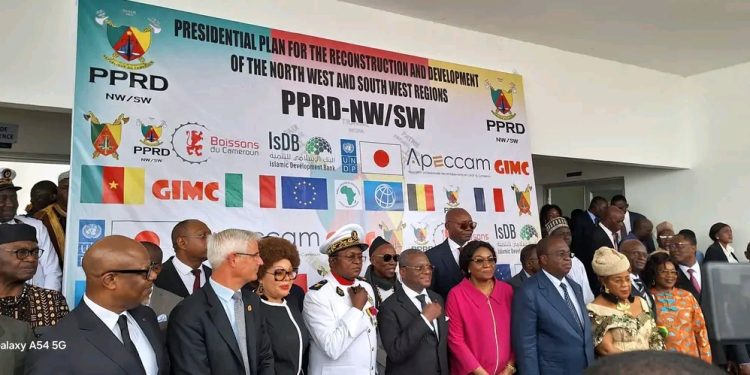The coordinators of the Presidential Plan for Reconstruction and Development of the North West and South West Regions (PPRD-NWSW) report that they have made significant progress in rebuilding key sectors of the two conflict-hit Anglophone regions.
The plan, which aims to foster peace and development, has so far delivered a range of community-based projects, according to its coordinators.
These include the issuance of 800 lost civil documents, organisation of 88 socio-cultural activities, and rehabilitation and equipping of women’s centres aimed at strengthening social cohesion.
In terms of basic infrastructure, the PPRD reports having rehabilitated 99 schools, 39 health facilities, and four bridges.
The plan also contributed to projects like the Bamenda Ring Road, parts of the Bamenda-Babajou road, and the Kumba-Ekondo-Titi road.
PM Chairs 6th Steering Committee Meeting
On Friday, May 30, the public saw the presentation of these projects during the 6th Steering Committee session of the PPRD, held in Buea and chaired by Prime Minister Dr. Joseph Dion Ngute, who also supervises the plan.
The meeting convened key stakeholders from the North West and South West regions. Budgeted at FCFA 2,500 billion, the plan seeks to restore dignity, enhance infrastructure, and pave the way for sustainable development in the crisis-hit regions.
The PPRD is structured in three phases: Recovery, Reconstruction, and Development.
Progress reports from the committee show that the recovery phase has achieved 64.65% completion in infrastructure, 26.93% in livelihoods, and 9.29% in social cohesion.
Under the reconstruction phase, the plan has injected FCFA 20 billion into the Cameroon Development Corporation (CDC) to support salary payments.
It has also funded the acquisition of machinery for the Upper Noun Valley Development Authority (UNVDA).
“We Don’t Go in When It Is Hot”
The Anglophone crisis, which erupted in 2016 and escalated into an armed conflict, prompted the launch of the PPRD.
It has resulted in the deaths of over 6,000 people, according to the UN, and displaced thousands, causing billions worth of property damage.
Speaking at a press briefing after the committee session, Paul Tasong, President of the Steering Committee, said the plan is advancing cautiously in order to avoid unnecessary risks and loss of life.
“That is why we are not going into areas where the conflict is going on. We don’t go in when it is hot. We come in only when it is soft,” he said.
Tasong acknowledged that despite several operational challenges, the plan is steadily moving forward.
However, he cited limited funding as one of the major hurdles the initiative continues to face.
However, Paul Tasong remained hopeful that more partners will come in.



